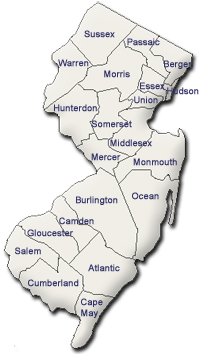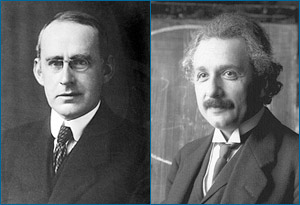Related Topics
Quakers: All Alike, All Different
Quaker doctrines emerge from the stories they tell about each other.
Academia in the Philadelphia Region
Higher education is a source of pride, progress, and aggravation.
Nobel Prizes
Some Philadelphians won Nobel Prizes for work done here, or elsewhere. Some prize winners would deny they are Philadelphians, but their work was nevertheless done here.
New Jersey (State of)
 The Garden State really has two different states of mind. The motto is Liberty and Prosperity.
The Garden State really has two different states of mind. The motto is Liberty and Prosperity.
Quaker Theology
New topic 2016-12-04 04:18:19 description
Interesting Quaker Characters
All alike, but all different.
Two Pacifists: Einstein and Eddington

|
| Einstein and Eddington |
Very few claimed to understand what Einstein's Theory of Relativity was all about, but everyone could understand that giving a wartime Nobel Prize to a conscientious objector on the enemy side was political dynamite. It was not entirely a clear case; Einstein had indeed been a C.O. and was indeed the only member of the 94-person Prussian Academy to refuse to endorse the War. However, he had such a long history of taking the unpopular side of every argument that it was not certain whether he opposed the war or was merely sticking his thumb in the Kaiser's eye. At the same time, the most promising English astrophysicist, Arthur Eddington, was petitioning as a Quaker to be granted alternative service rather than be compelled to fight. Since Eddington was just about the only person claiming to understand and endorse Einstein's incomprehensible idea, it did not seem convenient to the British government to seem to endorse a German claim to enormous scientific achievement. It was decided to agree to Eddington's draft exemption on condition he conducts his own proposal for a definitive test of the theory. According to this idea, the light coming from a distant star should bend as it went past the sun. This proposal had the hidden advantage that a test could not take place until the 1919 eclipse of the sun, visible only from Africa or Brazil.
The experiment was hailed as a success, and a Nobel Prize followed shortly afterward, even though there were storm clouds over Brazil, and technical difficulties in Africa resulted in a rather blurred obscurity which would have baffled the public except for the enthusiastic acclaim of the only distinguished English scientist likely to understand the experiment. As telescopes have improved over the intervening century, it is now possible to observe the gravitational pull of much larger celestial bodies than the sun on a light which is coming to the earth from much more distant stars. Therefore, even schoolchildren can today see photographs of pinpoint starlight twisting into arcs of light while passing distant galaxies. Einstein the German has triumphed over Isaac Newton the Englishman, although the heady triumph probably did somewhat go to the heads of both Einstein and Eddington. Eddington the birthright Quaker allowed himself to be knighted, Einstein endorsed the dubious pacifist uprisings in Palestine, Eddington made a career of explaining puzzling scientific theories to the appreciative public. The direction of all this became clearer as some of the new theories Eddington promoted were discredited, and Einstein's pacifism has certainly become clouded by later thermonuclear events which he had a large hand in promoting.
Of the two, Einstein has proved to be the greater scientist, but Eddington would have been a scientific luminary without any association with the German, perhaps even a greater one without inevitable comparison between the two. Einstein spent the last 23 years of his life on the fringes of Philadelphia, at Princeton, but Philadelphia had little consciousness of his presence.
Originally published: Sunday, November 11, 2007; most-recently modified: Friday, June 07, 2019